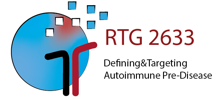Philipp Köcher
Nutritional Treatments to Improve Inflammatory IgG Fc Glycosylation
Background: Patients with inflammatory autoimmune diseases often begin to express IgG autoantibodies (autoAbs) years before they develop overt clinical disease. In addition, healthy individuals can express IgG autoAbs in the absence of disease symptoms. There is a correlation between the switch of the autoantigen-specific and total blood IgG Fc glycosylation pattern to more non-galactosylated forms prior to the development of inflammatory autoimmune diseases. Accordingly, non-galactosylated IgG Abs have been associated with inflammatory functions, whereas galactosylated plus terminal sialylated IgG Abs have less inflammatory or anti-inflammatory properties. Furthermore, in models of systemic lupus erythematodes (SLE) and epidermolysis bullosa acquisita (EBA), we showed that only those IgG autoAb-positive mice that "switched" to more agalactosylated IgG autoAbs became sick. In addition, the level of total IgG galactosylation and sialylation in the blood is a biomarker of an individual's biological age. Accordingly, a healthy diet may increase the level of total blood IgG galactosylation and sialylation, thereby decreasing biological age and improving inflammatory (auto)immune conditions. Secondary plant substances are associated with anti-inflammatory effects, but little is known about their influence on the immune system.
Objective: Our aim is to study the impact of different diets on IgG Fc-glycosylation and inflammatory (auto)immune conditions in mice and their influence in corresponding patients. We will explore the potential of selected nutrients to increase total blood IgG galactosylation and sialylation to ameliorate inflammatory (auto)immune conditions in mice and humans.
Work program: (i) We will treat mice prophylactically or therapeutically with different selected nutrients in their drinking water to study the influence on IgG glycosylation, T and B cell responses and inflammatory (auto)immune conditions. Furthermore, (ii) we will analyze the effects of diets in patients with inflammatory (auto)immune conditions on IgG glycosylation, T and B cell responses and disease severity. Total and/or antigen-specific IgG Fc glycosylation pattern will be investigated by HPLC and/or LC-MS and immune cells by flow cytometry.

- People
- Doctoral researchers
- Merabell Adem
- Katja Adriany
- Farbod Bahreini
- Aderiike Babarinsa
- Isha Barve
- Estelle Bergmann
- Swayanka Biswas
- Noa Linn Brauckmann
- Christoph Brieske
- Jana Buhre
- David De Luca Laredo
- Felicitas Eichlohn
- Kaan Ersoy
- Ferdinand Gebauer
- Lennart Gooß
- Fatemeh Gorzin
- Maja Grote
- Alanis Barbosa Gulde
- Jiaxi Guo
- Sen Guo
- Veronika Hartmann
- Michelle Hein
- Marie Jaboreck
- Luise Janusch
- Maj Jäpel
- Jakia Khan
- Anna Knauer
- Valentin Kneitz
- Philipp Köcher
- Maximilian Lahmer
- Wing Yu Lee
- Jian Liu
- Isabelle Luckow
- Kristina Manzhula
- Daniel Mehlberg
- Sahar Mehrabani
- Afsaneh Mehrpouyan
- Yasaman Mirzaee
- Sadegh Mousavi
- Danial Namazi
- Dennis Niese
- Roqayeh Noori
- Milica Novovic
- Josepha Nunold
- Ludwig Ohlrogge
- Justus Ohmes
- Bianca Opelka
- Colin Osterloh
- Anne-Sophie Pagel
- Cristian Papara
- Isa Popken
- Tina Rastegar Lari
- Daniel Rohling
- Felix Sajon
- Rochi Saurabh
- Alessia Maria Sbaraglia
- Jovan Schanzenbacher
- Mareile Schlotfeldt
- Carolin Schmidt
- Solveig Lea Schmidt
- Leon Schmidt-Jiménez
- Nora Schoell
- Lena Schröder
- Hannah Schumacher
- Salomini Sinnathurai
- Sarah Stenger
- Lene Sophie Urban
- Chiara Walczyk
- Nele Wellbrock
- Julia Wimmer-Gross
- Pia Witt
- Natalia Zappe
- Kiana Zarabadi
- Jianrui Zheng
- Luca Zillikens
- Carla Zünkeler
- Participating researchers
- Early career researchers
- Administration
- Finished doctoral degrees
- Doctoral researchers



